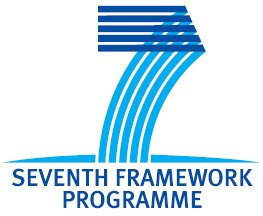Related Events
Call for Participation: AHM2010
Workshop / mini-symposium on trends, issues and challenges in future high-end computing.
In the context of the All-Hands-Meeting 2010, Cardiff, UK, 13-16 September 2010.
Check out the workshop report page for more information about the workshop outcomes.

With the movement from the “frequency race” to the “core race”, issues formerly restricted primarily to High Performance Computing (namely scalability, distribution etc.) become more and more relevant for day-to-day computing. Future applications can no longer rely on stronger (in the sense of faster) compute infrastructures, but have to cater for more parallelism – this denotes a complete conceptual change for application & tools developers who so far extended the capabilities of their system simply by relying on the fact that future computers will be fast enough for smooth execution.
At the same time, the range of core and computer types constantly increase, leading to a wider heterogeneity of resource infrastructures for which the applications have to cater. Standard monolithic operating systems try to address a variety of platforms on the cost of performance, whilst efficient OS as used for High Performance Computers are typically specifically devised / adapted to the respective infrastructure. Furthermore, the scale will increase beyond the manageability of a single OS instance, and future internet and cloud systems will incorporate multiple concurrent OS instances. Consequently, developers, middleware providers, and resource administrators will face multiple issues when trying to scale and efficiently execute future applications.
Implicitly and at the same time the size of data and the range of process types increases nearly exponentially and obviously faster than networks and platforms can deal with. Distributed applications, concurrent access, multi-tenancy etc. all will grow in significance over the next years.
In the scope of this symposium-like workshop, trends in high end computing development shall be discussed in-depth with a specific focus on challenges and issues to be addressed via current and future research. This relates in particular to the issues arising from the move of single, high-frequency cores in distributed environments to the large-scale, widely distributed many-core devices currently under way. In this context, two major strands can be identified that will be pursued by this workshop:
STRAND 1: SCALABLE INFRASTRUCTURES.
The increasing scale and heterogeneity of infrastructures (ranging from many-core systems over large-scale clusters to clouds) implies that classical approaches to their management are not sufficient anymore: monolithic OS scale badly, cache coherency takes exponentially more cycles etc. Topics in this strand include, but are not restricted to:
- next generation operating systems
- next generation processor architectures
- management of cache, interconnect etc. in large scale many-core systems
- clouds on a chip
- etc.
STRAND 2: SCALABLE CODE AND DATA.
In order actually make use of the infrastructure, applications and data need to become more scalable, which implies in particular that it becomes easier for the user to develop for and exploit parallel systems. This strand includes, amongst other, issues related to:
- segmentation and distribution methods
- parallel programming models
- efficient scaling behaviour
- High performance data access
- Data replication strategies for large data sets
- Performance optimisation techniques
- Metadata management
- HPC Clouds
- etc.
The workshop is organised in two sessions: session 1 will present submitted contributions and session 2 will allow for in-depth discussion of selected contributions and issues. You can provide abstracts for either session:
- If you want to participate in session 1, please provide your abstract for a full presentation following these guidelines:
Abstracts should consist in unpublished, original work of not more than 3 pages in length using single spaced 10 point size on A4 pages - including 2 pages of text and (optionally) 1 page of figures and tables. Authors should submit abstracts satisfying the Formatting Guidelines as a PDF file using the AHM 2010 Abstract Submission system, which is now accessible via the Abstract Submission page (http://www.allhands.org.uk/abstract-submission)
AHM 2010 is using the EasyChair system for abstract submission. We are asking that you submit extended abstracts (two pages of text and one page of supplementary material consisting of figures, tables).
- If you aim at participating in session 2, please provide position papers as follows:
Position papers should elaborate trends and issues that you foresee in future high-end computing with respect to the workshop topics - they should not be about your current work results. Submissions should be 1-2 pages in length using the same formatting as for the full presentation abstract. All papers must contain name of the author, position and organization, as well as a list of keywords that apply to the topic. Please send your contributions to This email address is being protected from spambots. You need JavaScript enabled to view it. (schubert_AT_hlrs.de).
The workshop is supported by the TeraComputing research projects S(o)OS and TERAFLUX.
All invited contributions will be published via the AHM and the S(o)OS website.
Important Dates:

May 14th: abstract submission deadline
May 24th: extended abstract submission deadline
July 02nd:decisions to authors
Sep 13th: All Hands Meeting 2010
Workshop Committee
- Lutz Schubert, High Performance Computing Centre Stuttgart (chair)
- Matthias Assel, HLRS Stuttgart (chair)
- Götz Brasche, Europäisches Microsoft Innovations Center GmbH
- Johannes Helander, Europäisches Microsoft Innovations Center GmbH
- Rui Aguiar, Instituto de Telecomunicacoes, Universidade de Aveiro
- João Paulo Barraca, Instituto de Telecomunicacoes, Universidade de Aveiro
- Giuseppe Lipari, Scuola Superiore Sant'Anna
- Tommaso Cucinotta, Scuola Superiore Sant'Anna
- Jan Kuper, University of Twente
- Christiaan Baaij, University of Twente
- Roberto Giorgi, Universita' degli Studi di Siena
Please visit the AHM website (http://www.allhands.org.uk/) for more details on the All Hands Meeting.
Participation is not restricted to the UK.
Contact: Lutz Schubert





